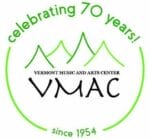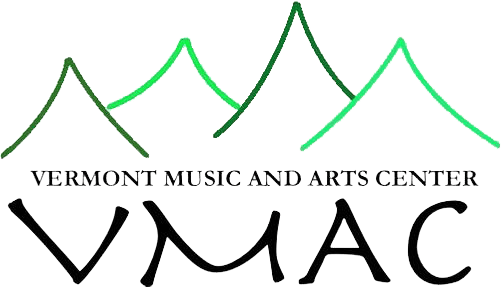VMAA Vermont Music and Arts Association Center
How VMAC Functions
VMAC differs.
Our faculty, professional musicians with extensive chamber music experience, often play with us, coaching from within the group, and inspiring us with their example.
In addition, instead of relying on assigned groups or pieces, we choose our own repertoire from the suggested Works of the Week, from the music we bring with us, or from VMAC’s extensive library of over 1,000 chamber works.
Groups may choose to cap off a week of studying a particular piece by playing a movement in the Friday night participant concert. Open readings for larger ensembles, early music, choral and visual arts workshops, folk dancing, plus exciting faculty performances round out the opportunities for participants to create their own musical vacation.
VMAC is unique.
Many participants eagerly look forward to the freedom of a VMAC week – the freedom to form one’s groups, ask a coach to play within or coach from without the group, and to play as much or as little as desired. There is, however, a fundamental pattern to each day: five playing sessions of 85 minutes each at 9:00, 10:35, 2:00, 3:35 and 7:30, punctuated by meals in the dining hall, optional madrigal singing at 1:00, free time at 5:00 and a social hour with snacks at 9:00.
Participants make their own schedules within the daily structure, playing as much or as little as they want. Sheet music may be checked out from VMAC’s thousand-piece library at any time.
Early Music sessions, at 9 am daily in the harpsichord room allow both newcomers and veterans to make music together without scheduling anything in advance. Other open sessions include the Wednesday afternoon Bach Bash and the opening night Large Ensemble.
Many participants look forward to completing various projects in the well-appointed art room, from stained glass to tie-dye to print-making to other media.
Exploring the exceptionally scenic Northeast Kingdom, which abuts the Canadian border, is also quite popular. Morning walks through the campus with the mist still rising from the mountains, folk dancing, faculty concert, voluntary performance in Friday night concert, and the ever-popular Saturday night Fun Night full of zany skits and uninterrupted laughter bring great variety to a VMAC week.
How, you may be wondering, does scheduling actually work? Newcomers are assigned to two, get-acquainted, ensembles for the first full day (works to be played are agreed upon). Participants find a variety of other ways to connect:
- the faculty runs a “Bookie Table” at breakfast, pairing you with others who are free at various times
- some participants use meal times and social hours to book same-day sessions and beyond
- some arrange to play specific pieces with specific musicians before VMAC begins using the list of participants by week emailed in advance
- newcomers can request a ‘buddy’ who can introduce them to other players.
Faculty can be invited to play with you.
At VMAC the faculty looks forward to playing in your group or to coaching it from without. More intensive coaching can also be arranged through the popular WOW (Works of the Week) format. Other coached multi-session groups are easy to create, especially before the program begins in July. Slots are scheduled for pre-formed groups that are in contact with VMAC’s volunteer scheduler by late spring. Even if a participant opts for the maximum of two WOWs (or two other coached, multi-session groups), 24 other sessions during the week are still available for forming ad hoc groups or enjoying other activities.
Wind players tend to organize their playing sessions more fully than strings at the beginning of the week due to the nature of the wind repertoire. Pianists have a broad selection of chamber works in the VMAC library to choose from. Vocalists can arrange sessions with a variety of instruments and with other singers.
VMAC has a very different structure from most amateur music workshops, allowing much more freedom to select music and playing hours. But there is a fundamental pattern to each day: five playing sessions of 85 minute each, at 9:00, 10:35, 2:00, 3:35 and 7:30, punctuated by breakfast, lunch, dinner and optional madrigal singing at 1:00, free time at 5:00, and a social hour with snacks at 9:00.
Instead of pieces and groups being assigned and performed, each participant makes their own schedule within the daily structure. Participants can select music from the vast number of titles in the VMAC library or bring music they would like to work on. We are free to play as much or a little as we want.
In addition to the five playing sessions, there is also Early Music each morning in which anyone can play, plus other weekly open sessions such as Bach Bash and Large Ensemble. Sessions can be spent in the art room, or take time off to explore the Northeast Kingdom or just relax. There are walking groups, folk dancing, faculty concerts, voluntary participant concerts, and the ever popular Fun Night where the fun gets taken to a new level.
How, you may ask, do ensembles get formed for so many different groups to play at so many different times? Newcomers are assigned to two ensembles in the first day, but all other sessions are arranged by the participants themselves. Our faculty also runs a “Bookie Table” in the dining hall where anyone who is free and wishes to play can sign up. At meals and social hours we ask each other to play, forming ensembles for each particular session up to our personal limit of stamina and desire. One useful strategy is to prepare a few works in advance and assemble groups to play them. A new participant will not know many, if any, of the other players, but the first one asked will be able to help recruit the rest of a group. Newcomers can also request a “buddy” who can answer questions in advance and introduce them to other players. Once the ice is broken, the whole process becomes easier.
Faculty can be invited to play with or coach the participants
Another way in which VMAC is different from other music workshops is that the faculty can be invited to play with or coach the participants – usually limited to one faculty member per group. At the start of each session the group can decide to ask the faculty member to take a very active coaching role while playing, or can have asked a faculty member to coach without being a playing member.
More intensive coaching can also be arranged within this basic format. Each year a list of suggested “Works of the Week” is chosen by the faculty to be played for three separate sessions, to provide a deeper coaching experience. Participants are also free to arrange such multi-session groups for other works. Participants may arrange such a group in advance using the list of plans to attend that is distributed in May or by contacting friends from prior years. These preformed groups are assigned to three specific sessions, leaving the remaining sessions (6 days X 5 sessions/day – 3 sessions preformed = 27 sessions) free for groups to be arranged at VMAC or left free for other activities.
The wind players tend to organize their playing sessions more completely at the beginning of the week than string players do. Their repertoire is split into so many different combinations just for five kinds of instrument, and of course includes other works involving strings and/or piano with the winds. The string players are more numerous and divided among only three instruments (plus the occasional bass). They have a great many works available in the library for fewer types of ensemble, making it easier to form a group and then mutually decide what to play. Pianists also have a broad selection of works to choose from, piano works taking up about as much space in the library as chamber works without piano. Vocalists who are not also instrumentalists are uncommon, and the library has a more limited selection for them, but VMAC provides a good opportunity to sing with instruments in addition to piano, as well as in the daily singing group.
Support
If you have any questions or need further elaboration, please call or email.
vmacinfo@gmail.com
Phone
(610) 298-3609
Related Questions
A: Unfortunately not. Couples can be given 2 adjacent rooms in the same suite.
A: Yes, there is a stove, microwave, fridge and sink, but bring your own plates, utensils and pans, etc.
A: Music and your instruments. Sheets, towels, a blanket and pillow, soap and toiletries, rain gear, a flashlight, a fan and a desk lamp. Casual clothes suitable for the uncertain weather in northern Vermont. Contact the VMAC Coordinator well in advance if you can't bring your own sheets etc.
A: No. Some common areas and the dining hall do have air conditioning, though.
A: VMAC doesn't assign groups or pieces. You are free to choose a WOW or any other piece and form groups including a coach for more intensive study.
A: There are 2 grand pianos available and 7 uprights - plus a harpsichord.
A: Food choices are varied and delicious. There is a comprehensive salad bar in addition to soup and several hot entrees and, of course, Vermont ice cream. The cafeteria staff also pays special attention to dietary sensitivities, such as allergies and those who are vegans.
A: Unlike most other music workshops, our coaches not only coach but play with us. In fact, they love to play with us and will perform with us as well. We are like family at VMAC.
A: Yes and no. There are recommended pieces called Works of the Week that will be the focus for anyone choosing to do so and coached groups will be created for those pieces. However, VMAC participants also have the freedom to explore (and perform) other repertoire as well.
A. Somebody appointed by the faculty sets up the schedules. These days, it's Lincoln Brown, a fine violinist in his own right. The person organizing the WOW group contacts Lincoln, e.g., by phone or email, once the group has been put together.
A: The Northeast Kingdom of Vermont is renowned for its beautiful mountains, lakes, and charming towns. One can enjoy local restaurants or visit the local woodworking shop in Burke where a couple not only makes beautiful wooden bowls, but raise miniature donkeys as well! Nearby St. Johnsbury has a beautiful museum and the Dog Chapel replete with art by the late Stephen Huneck.
A: VMAC is held at the Northern Vermont University campus in Lyndonville, VT. Dorm rooms are in suites with 2 full baths and a full kitchen. Some of the community rooms on campus are air conditioned.
A: No; VMAC is largely the experience you want it to be. If you like to perform, you can play in (up to) two performances at our weekly concert (three if one of them is singing with our Madrigals group.) If you prefer to listen at the concert, that’s fine, too.
A: The close-bonded community that stems from our common love of chamber music. VMAC is a small, friendly, welcoming community where music, art, nature, and friendship prevail.
A: Please see the Application page for the refund policy.
A: We have the options of Early Music with harpsichord and other instruments (recorder, etc) led by an early music specialist, Madrigal Singing led by a professional singer; and a full-time art program led by a local professional artist. There is also an evening of folk dancing led by a folk dancing specialist.
A: Unfortunately, inflation has hit everyone hard including VMAC. The college raised its charges by 5% and cut even more services. We also increased pay for faculty and the workshop manager. We expect our other costs to rise as well. We’re just trying to break even so we can maintain financial security - now and in the future.

